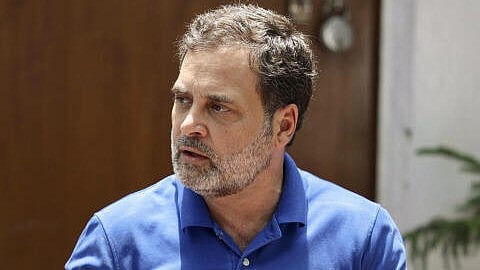
Leader of Opposition Rahul Gandhi
Credit: PTI Photo
New Delhi: Last June, the Opposition I.N.D.I.A. was euphoric after reducing the Narendra Modi-led BJP to below majority mark in the Lok Sabha elections but it appears that the ruling regime has clawed back with Assembly victories and skilfully drawing its opponents into its den as one saw with multi-party delegations post Operation Sindoor.
The Opposition is finding it difficult to remain united outside Parliament where it has managed to show a semblance of unity over a variety of issues inside Lok Sabha and Rajya Sabha though one-upmanship on some occasions had threatened to derail a spirited fight against the Modi government, which is surviving on the support from coalition partners.
While partners grudgingly accepted its improved performance in Lok Sabha polls despite being a pale shadow of its past, recent months saw the Congress facing questions on its leadership role after its dismal electoral performance in Haryana and Maharashtra. Alliance partners skipped meetings on Parliament floor strategy while going ahead with their own protests plans.
However, the government’s decision to introduce a Bill on Waqf property management brought the Opposition together, with the parties sitting together for a meeting for the first time in months. While the BJP sent a signal that it was not diluting its aggressive Hindutva position despite being in a coalition, the I.N.D.I.A. was relieved that there was no desertion from its side.
With Congress regaining its fighting spirit with Rahul Gandhi in the seat of Leader of Opposition in Lok Sabha, his pet themes like Caste Census got an impetus inside and outside Parliament though parties like Trinamool Congress were not enthusiastic to join the bandwagon.
But the Modi government’s surprise announcement of including Caste Census in the next decennial Census in April, days after the Pahalgam terror strike, took some sting out of the Opposition’s vociferous social justice plank. Rahul and Congress were quick to claim credit for the government decision saying its pressure worked.
While the Opposition found unity on Waqf law, the same could not be said about the post Operation Sindoor scenario.
The government managed to divide the Opposition and sow trouble in Congress by choosing leaders like Shashi Tharoor against its wishes for multi-party delegation while sidestepping the demand for a Parliament special session by announcing Monsoon Session 47 days ahead of schedule.
The Opposition circles are of the view that it was not able to take advantage of the discomfort in the ruling BJP after rightwing ecosystem too found fault with Modi government’s approach with the sudden ceasefire and claims of being diplomatically isolated with countries hyphenating Pakistan with India and putting the onus on New Delhi to ensure peace.
A senior leader quipped that the Opposition MPs who joined delegations as part of “national duty” should also understand this includes making the government accountable but their actions have blunted aggression from the Opposition and given the government a leeway.
The I.N.D.I.A. is also facing an electoral challenge later this year in Bihar and it would test its narrative of Caste Census and Operation Sindoor. On paper, the constituents of the alliance in Bihar remain united but the challenge would be reasonable seat distribution.
Assembly elections in West Bengal, Kerala, Tamil Nadu, Puducherry and Assam next April-May will also test I.N.D.I.A.’s resolve. Incidentally, in all states except Assam that faces polls next year, the I.N.D.I.A. constituents are facing each other.
